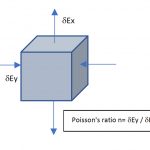Tag Archives: Tensile Testing
Poisson’s Ratio
 Poisson’s ratio is one of the material properties describing ability of the material to accommodate deformations. Thus, when a material is squeezed in one direction it will try to expand in other direction when unconstrained. Equally when the material is stretched it will contract in other directions. Poisson’s ratio relates various moduli of materials. Thus, Young’s modulus or elastic modulus, E is related to shear modulus G through a relationship E=2G (1+Γ), where n is Poisson’s ratio. Equally bulk modulus, B is related to Elastic or Young’s modulus through a relationship B=E / 3(1-2Γ). Poisson’s ratio varies from 0 to 0.5 with most metals and alloys around 0.33. Materials with some very low passion’s ratio are concretes, cork, wood etc. Generally, Poisson’s ratio is measured in the elastic range of a simple tensile test.
Poisson’s ratio is one of the material properties describing ability of the material to accommodate deformations. Thus, when a material is squeezed in one direction it will try to expand in other direction when unconstrained. Equally when the material is stretched it will contract in other directions. Poisson’s ratio relates various moduli of materials. Thus, Young’s modulus or elastic modulus, E is related to shear modulus G through a relationship E=2G (1+Γ), where n is Poisson’s ratio. Equally bulk modulus, B is related to Elastic or Young’s modulus through a relationship B=E / 3(1-2Γ). Poisson’s ratio varies from 0 to 0.5 with most metals and alloys around 0.33. Materials with some very low passion’s ratio are concretes, cork, wood etc. Generally, Poisson’s ratio is measured in the elastic range of a simple tensile test.
Application and Influence
Just like several mechanical properties like Yield, ultimate strength, etc., Poisson ratio helps in the design of structures. It helps to understand secondary stresses that will develop during service. Thus, for example in high pressure fluid transport through pipes, when pressure pulses arise the hoop stress that develops will induce secondary stresses in longitudinal direction which will force the pipes to contract. If these pipes have welded sections, sometimes the weldment may fail due to this contraction. Another situation where Poisson’s effect may impact is in Geological deformations like earthquakes, etc. Materials with high Poisson’s ratio will contract a lot compare to materials with low Poisson’s ratio.
Capability – At Touchstone Testing Laboratory, we have capability to measure Poisson’s ratio. Typically, we measure Poisson’s ratio in tension mode. We use biaxial strain gage or dual extensometer to measure the deformation. Generally, we measure Poisson’s ratio at ambient conditions like room temperature air. If the customer requires we can measure Poison’s ratio in non-ambient conditions like low temperatures or high temperatures.
Relevant standards:
- ASTM E132- Poisson’s ratio measurements
Formability Testing
Formability is the materials ability to be shaped in to semi-finished and finished products by manufacturing techniques like rolling, forging, extrusion, deep drawing, etc. Many transportation equipment like cars, trucks, air planes, etc., use thin sheet metals generally steel and aluminum alloys formed in to respective shapes by processes such as deep drawing, bending, etc.,… Continue Reading
Tensile Testing
Tensile testing helps to determine basic load bearing capabilities of materials under tension. These properties are used in engineering and design of components and structures. Typical examples where these properties are used are design of guy cables that support bridge structure, wind turbines, aircraft wings and fuselage structures, etc. One can get several material parameters… Continue Reading
Product Testing
Product testing generally refers to testing finished products before being shipped to customer or consumer. It differs from material testing in that an additional aspect of product geometry, product surface, etc., their influence on the product performance is tested. Some well-known examples of product testing are automotive crash testing to assess crash worthiness of the… Continue Reading



Touchstone is committed to providing its customers with quality, reliable test results. That is why we have undertaken the rigorous steps needed to meet and secure the most stringent of test lab accreditations including ISO/IEC 17025, NADCAP 7101 (Materials Test Lab) and NADCAP 7122-I (Non-Metallics Materials Testing).
© 2024, Touchstone Testing Labs | Design by Wheelhouse Creative

